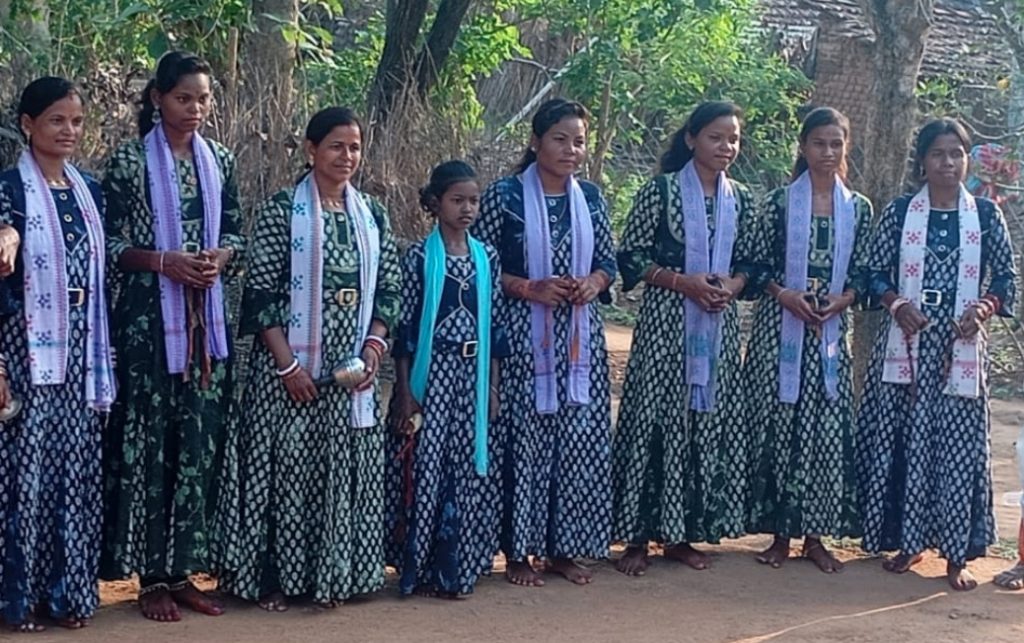Keonjhar: In the verdant, fire-prone landscapes of Keonjhar district, where the whispers of ancient forests meet the struggle for survival, a remarkable woman has emerged as an unlikely beacon of hope. Pramila Pradhan, a humble farmer from Murgapahadi village, is not wielding axes or fighting flames with hoses. Instead, she is armed with something far more powerful: the resonant power of Radhakrushna Sankirtan, traditional devotional music, transforming hearts and minds to safeguard Odisha’s precious green cover.
Her journey, deeply rooted in a profound love for nature, was ignited by a tragedy that unfolded over a decade ago, a memory that still brings a flicker of pain to her eyes.
The Deer’s Last Run: A Catalyst for Change
It was 2010. Pramila had recently arrived in Murgapahadi, a newlywed, leaving behind her childhood home near the vast, ecologically rich Similipal forest in Mayurbhanj. One sweltering afternoon, as a fierce forest fire raged nearby, a terrified deer, its fur singed and eyes wide with panic, burst from the smoke-choked woods and stumbled into the village. Instead of finding refuge, the hapless creature was met with fear. Villagers, anxious about a wild animal in their midst, chased it relentlessly. The deer, already weakened by the inferno and the desperate flight, collapsed and died.
“It melted my heart,” Pramila recounts, her voice soft but firm, the memory still vivid. “To see such a beautiful, innocent life perish, not by the fire it escaped, but by the very people who could have helped… it ignited something deep within me. I knew then that I had to do something to douse the fires, not just in the forest, but in the hearts of people.”
This incident, a stark collision of human fear and nature’s vulnerability, became the defining moment for Pramila. Having grown up immersed in the rhythms of Similipal, one of Odisha’s largest and most biodiverse forests, her spirit was intrinsically linked to its well-being. The deer’s death was a visceral reminder of the escalating human-wildlife conflict and the devastating impact of unchecked forest fires, particularly during the harsh summer months that plague the region.
Reviving a Legacy: The Sankirtan Mandali
For years, Pramila harbored this quiet resolve. Her love for singing, a divine art passed down through generations, was a constant companion as she toiled in the fields alongside her husband, Guru Charan Pradhan. In 2021, an opportunity arose to channel this passion into action. Her father-in-law had once led a Radhakrushna Sankirtan Mandali, a group dedicated to devotional singing, but it had fallen into disuse. Pramila saw a chance to revive this cultural legacy, infusing it with new purpose.
“My father-in-law had a beautiful vision for this Mandali,” Pramila explains, a proud smile gracing her lips. “He believed in the power of devotion and community through music. I felt it was my duty to bring it back to life.”
Under her leadership, the moribund group blossomed. Pramila, with her natural vocal prowess and innate ability to connect with people, quickly attracted local talent, particularly adolescent girls who found not only a creative outlet but also a means to earn a modest income by performing at festivals and ceremonies. The Mandali’s performances, characterized by their soul-stirring hymns and vibrant energy, soon gained widespread currency among the villagers. They became a familiar sight at Akhand Nama Yagnyas, thread ceremonies, and other community gatherings, moving from one village to another, their melodies weaving a tapestry of devotion and cultural revival.
An Unconventional Partnership: Foresters and Folk Art
While Pramila’s Mandali was flourishing, the Atei Reserve Forest, a critical ecological zone in Keonjhar, faced an existential threat. Forest officials, despite their best efforts, were struggling to contain the rampant forest fires that annually decimated vast swathes of pristine woodland. Traditional awareness campaigns often fell flat, failing to resonate with local communities whose livelihoods were intricately linked to the forests, yet who sometimes inadvertently contributed to the problem through practices like shifting cultivation or carelessly discarded embers.
“We were desperate,” admits Kandarpa Mohanta an officer with the Keonjhar Forest Division. “Every year, we’d lose so much. We tried posters, meetings, direct appeals, but the message wasn’t sticking. We needed something that spoke to the heart, something that was part of their own culture.”
It was during one such brainstorming session with team of Forest Officials, including Ranjit Palei, Om Prakash Jena and Jatindra Kumar Sahu, who have witnessed the captivating performances of Pramila’s Mandali, clicked upon an idea. “Why not use Sankirtan?” they proposed. The idea, initially met with skepticism, quickly gained traction. The power of music, particularly devotional music deeply embedded in local culture, offered a unique avenue to reach communities in a way that dry statistics and stern warnings never could.
Thus began an unconventional but profoundly effective partnership. Forest Officials from the Atei Reserve Forest approached Pramila, explaining the dire situation and proposing that her Mandali become ambassadors for forest fire prevention and nature conservation. For Pramila, it was the perfect convergence of her passion and her purpose.
The Message in the Melody: Singing for a Greener Future

Pramila and her team embraced the challenge with fervor. They began crafting new compositions, weaving messages of environmental protection, the dangers of forest fires, and the importance of wildlife conservation into the traditional Radhakrushna hymns. Their performances became more than just devotional acts; they were powerful educational tools, delivered with the emotional resonance that only live music can convey.
“We explain how the forest is like our mother, providing us with everything – clean air, water, food, shelter for animals,” Pramila elaborates on their approach. “We sing about the deer that lost its life, about the birds whose nests are destroyed, about the very air we breathe becoming toxic. We tell them that protecting the forest is protecting themselves, their children, and their future.”
The impact was immediate and profound. Unlike official lectures, the Sankirtan performances drew large crowds, captivating audiences with their melodic storytelling. Villagers, who might otherwise have been indifferent, listened intently as the familiar tunes carried a new, urgent message. The Mandali’s reach expanded rapidly. They have now performed in over 50 villages across Keonjhar district, a region that holds particular significance as it is the home district of the current Chief Minister, Mohan Charan Majhi. Their efforts are not just about fire prevention; they encompass a broader message of ecological balance and responsible living.
Balancing Acts: Farming, Family, and Forest Care
Pramila’s life remains a delicate balance. A dedicated farmer, she continues to work her fields alongside Guru Charan, their days punctuated by the rhythmic sounds of agricultural labor and, often, the impromptu singing of devotional songs. Guru Charan, her steadfast partner, is her biggest supporter, recognizing the vital importance of her mission.
“She has a gift,” Guru Charan says, his eyes twinkling with pride. “Her voice can move mountains, and her heart is pure. When she sings about the forest, people listen. It’s more than just music; it’s a prayer for our land.”
This unwavering support extends to their two sons, who are growing up witnessing their mother’s extraordinary dedication. Pramila, an ardent devotee of Presiding Deity of Keonjhar, Maa Tarini, believes her initiatives are blessed, allowing her to scale up her efforts despite the logistical challenges of traveling to remote villages.
The Mandali also serves as a vital economic lifeline for the adolescent girls who have joined. “Many of these girls come from humble backgrounds,” Pramila explains. “Through Sankirtan, they not only learn about our culture and the importance of nature, but they also earn a little money for their families. It gives them confidence and a sense of purpose.”
A Voice Heard: Beyond the Village Borders
Pramila’s remarkable work has not gone unnoticed. Recently, she received an invitation to an interaction session at Hotel LyFE in Bhubaneswar, a prestigious event bringing together environmentalists and community leaders. Initially, the prospect of traveling to the state capital and staying in a hotel filled her with apprehension. “I am a simple village woman,” she confessed, “I was very worried about going to such a big place.”
But once again, Guru Charan’s encouragement proved pivotal. “He told me, ‘Pramila, your voice needs to be heard beyond our village. This is an opportunity to share your message with more people who care about nature and wildlife.'”
With his support, Pramila made the journey. The seminar proved to be a transformative experience. Surrounded by like-minded individuals, she felt a surge of validation and renewed energy. “I was very happy to attend, and meet people liking nature and wildlife,” she said, her smile radiating genuine joy. The interaction not only broadened her perspective but also connected her with a wider network of environmental advocates, potentially opening doors for even greater impact.
Pramila Pradhan’s story is a powerful testament to the fact that heroism often emerges from the most unexpected places. In a world grappling with environmental crises, her unique blend of traditional art, community engagement, and unwavering dedication offers a compelling model for grassroots conservation. The melodies of her Sankirtan Mandali are not just hymns; they are a vibrant, living prayer for the forests of Keonjhar, echoing a message of hope and resilience that resonates far beyond the village borders. She is, truly, singing for a greener tomorrow.


